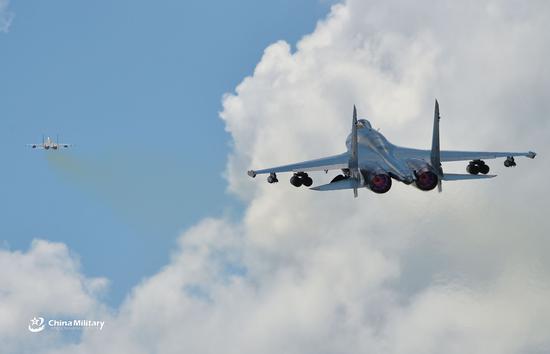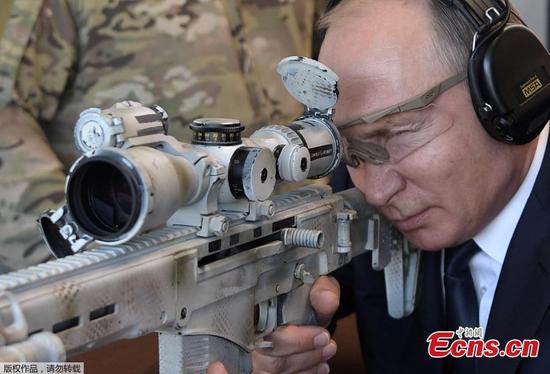It was the scenario Israelis and Russians have been working hard to avoid for the past three years since Russia became actively involved in the Syrian civil war.
Earlier this week, a Russian plane was downed by a Syrian air defense system whose missiles were targeting Israel aircraft that had carried out an airstrike on Syrian territory. All the complexities of the region came into play in critical seconds.
All 15 Russian servicemen on board were killed.
Israeli Air Force Chief flew to Moscow Thursday in order to share the findings of an Israeli interrogation of the incident, after Russian defense ministry officials blamed Israel.
The trip was a rare move that came after the Israeli military said it would dis all details it has on the event "including pre-mission information" as released in a statement by the IDF (Israel Defense Forces).
Speaking a day after the incident, Russian President Vladimir Putin adopted a different, more conciliatory tone, saying the incident was "a train of tragic accidental circumstances."
It would not be the first time there is tension between the two countries over the skies of Syria.
In recent years, Israel has carried out hundreds in airstrikes in Syrian territory aimed at Iranian-backed militant arms convoys and personnel.
As a testament to how rare the incident was, the IDF released an almost immediate announcement in which it "expressed sorrow for the death of the...members of the Russian plane" after "IDF fighter jets targeted a facility of the Syrian Armed Forces."
Israel has only taken responsibility for a few of the airstrikes carried out in recent years, with security officials quoted anonymously in the media saying that many such strikes have been undertaken by the country's air force.
The statement further went to say the Israeli aircraft were subject to "extensive and inaccurate Syrian anti-aircraft fire. It was that fire that hit the Russian plane."
In recent years, Russia and Israel have established a deconfliction system which is meant to prevent such incidents in the crowded airspace that both countries operate in.
Russia is not happy with Israeli involvement in Syria with Putin calling the latest incident "a violation of Syria's sovereignty" in a phone conversation with Israeli Prime Minister Benjamin Netanyahu.
Still, the two have managed to co-exist and by large avoid such clashes.
While Russia is the stronger of the two, it is hard to believe there will be many ramifications for Israel. There will likely be a few days in which Israel's freedom of movement in Syrian airspace will be limited, but it does not seem like Russia will take further action.
"Russia will most likely not escalate the situation," said Dr. Dina Lisnyansky of the Political Studies Department at the Bar Ilan University, "Putin will try to use the incident to gain further control of Syrian airspace...and show who is really in control of Syria."
The agreements between Israel and Russia are not signed as international accords but rather a result of numerous meetings and phone conversations between Putin and Netanyahu in recent years. Russia will be hard pressed to impose any sanctions on Israel.
In 2015, when the Turkish military downed a Russian airplane near the Syrian-Turkey border, Putin responded with a series of economic sanctions and the freezing of charter flights between the two countries - a major blow to Turkish tourism.
A critical difference this time is that Israel did not down the Russian plane.
"Russia will now strive to achieve a new status quo," she added. "For Israel, the desired outcome will be, at most, a minor change of the status quo and maintenance of good relations with Russia."
Netanyahu has often prided himself on his relations with the Russian leader.
"Israel needs to retain the relations. Russia is more than just a small regional power," Lisnyansky told Xinhua.
While there is a converge of interests between Israel and Russia, both disturbed by Iranian presence in Syria, Putin would ideally like to see Israel out of the field and that is unlikely to happen.
In a phone conversation between the two after the incident, the Israeli prime minister's office said Netanyahu noted "the importance of continued security coordination," and then went on to say "Israel was determined to prevent Iran from establishing a military presence in Syria."
Iran is believed to have thousands of operatives working in Syria in an effort to stabilize the regime of President Bashar Assad - a mutual interest with Russia, who plays a delicate balance act between arch enemies Israel and Iran.
The IDF had called the target of the latest strike an "intolerable threat" and it is likely Israel will continue to strike as long as it perceives such threats.
The results of this latest incident may mean an end to Russian acquiescence to Israeli actions in Syria and less maneuvering space for Israel which might be forced by Russia to give advance notice on pending attacks. If Israel should agree to that, it would mean longer time not only for Russia to prepare, but also for Syrian or Iranian-backed militias to seek shelter before a strike.
This would be a difficult pill for Netanyahu to swallow, but he might have to.
"Relations have always been very pragmatic," said Lisnyansky, "There is no reason this should not continue."
"We can presume that Israel will have to improve its coordination with Russia so that such incidents do not occur again," wrote defense commentator Yossi Melman in the Israeli NRG website, "In fact, it's almost a miracle that something like this did not happen until now."


















































